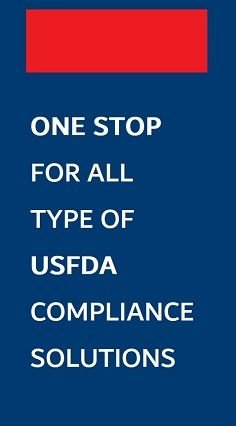USFDA Inspection
A USFDA inspection is a formal evaluation conducted by the U.S. Food and Drug Administration (FDA) to ensure that FDA-registered establishments/facilities comply with regulatory requirements for manufacturing, processing, testing, and distributing products like medical devices, pharmaceuticals, biologics, food, and cosmetics.
The purpose of an FDA inspection is to verify compliance with Good Manufacturing Practices (GMP) and Quality Management System Regulations (QMSR) under 21 CFR. It aims to protect public health by confirming that products are safe, effective, and meet quality standards. Inspections also assess facilities, documentation, and processes to ensure consistency and accuracy. Additionally, the FDA investigates issues such as complaints, adverse events, and product recalls during audits.
Key Areas Evaluated During FDA Inspection on Your Manufacturing Facility
- Facility Conditions: Cleanliness, maintenance, and organization.
- Manufacturing Processes: Consistency, validation, and record-keeping.
- Quality Control Systems: Testing procedures and compliance.
- Personnel Training: Competence and adherence to protocols.
- Documentation: Records, batch history, and complaint handling
Types of FDA Inspections Generally Conducted in Registered Establishments.
FDA inspections play a vital role in maintaining public health by ensuring that drugs, cosmetics, nutraceuticals, biologics, and medical devices meet safety, efficacy, and regulatory standards. These inspections serve various purposes. Each type of inspection is designed to address specific aspects of product development, manufacturing, and distribution, safeguarding consumers and maintaining confidence in regulated industries.
Pre-Approval Inspection (PAI): This inspection is conducted before the approval of a new drug, or biologic application to verify the data submitted and assess the readiness of the facility for production.
Routine Inspection: These are periodic evaluations aimed at ensuring ongoing compliance with FDA regulations. Routine inspections can be scheduled or unannounced and are meant to verify that facilities continuously meet the standards required for product safety and quality.
For-Cause Inspection: Triggered by complaints, recalls, or adverse events, this inspection focuses on investigating specific issues related to the safety or efficacy of a product.
Follow-Up Inspection: Conducted after a previous inspection, follow-up inspections verify that corrective actions have been implemented. They ensure that any issues noted in Form 483 observations or other violations have been adequately addressed.
Bioresearch Monitoring (BIMO) Inspection: This inspection evaluates compliance with Good Clinical Practices (GCP) during clinical trials. It ensures the integrity of data and the protection of subjects participating in clinical research, making sure trials are conducted ethically and reliably.
Expert USFDA Inspection Support Services – We provide guidance for compliance, inspection readiness, and corrective actions to ensure successful outcomes. Contact us today for professional assistance.
FDA Inspection Results: What They Mean for Your Company’s Compliance and Reputation
No Action Indicated (NAI): This outcome means that the facility is in full compliance with FDA regulations, and no issues were identified during the inspection. The company is operating as required, and there is no need for any further action.
Voluntary Action Indicated (VAI): Minor deficiencies were noted during the inspection, but they are not serious enough to require enforcement action. The company is typically allowed to voluntarily address these issues without further regulatory consequences.
Official Action Indicated (OAI): This outcome signifies that significant violations were found, requiring immediate corrective action. The company may face Form 483 observations, Warning Letters, and in severe cases, import bans, product recalls, or consent decrees, all of which can severely impact the business and its operations.
Are you looking for US FDA Certificate for your medical device, food, drugs, or cosmetics? Our expert team is here to assist you through the FDA Registration and listing process, ensuring your products meet all FDA requirements.
Frequently Asked Questions
Pre-Inspection Support Service Timeline
The timeline depends on the number of employees, the size of the production facility, and the number of products manufactured. Usually, 4-5 months is considered the ideal timeframe for effective implementation with full support from the process owners.
Fee for Closing FDA 483,s
| Industry | Service Fees | Onsite Visit Charges | Traveling & Accommodation |
| Medical Device | $3000 / Observation | $6000 / Man-day | Actuals |
| Nutraceutical | $4000 / Observation | $6000 / Man-day | Actuals |
| OTC Drugs | $5000 / Observation | $6000 / Man-day | Actuals |
| API | $5000 / Observation | $6000 / Man-day | Actuals |
US FDA Pre-Inspection Support Fee
| Industry | Service Fees | Onsite Visit Charges | Traveling & Accommodation |
| Medical Device | $900 | $1000 / Man-day | Actuals |
| Nutraceutical | $800 | $1000 / Man-day | Actuals |
| OTC Drugs | $1500 | $1000 / Man-day | Actuals |
| API | $1000 | $1000 / Man-day | Actuals |

